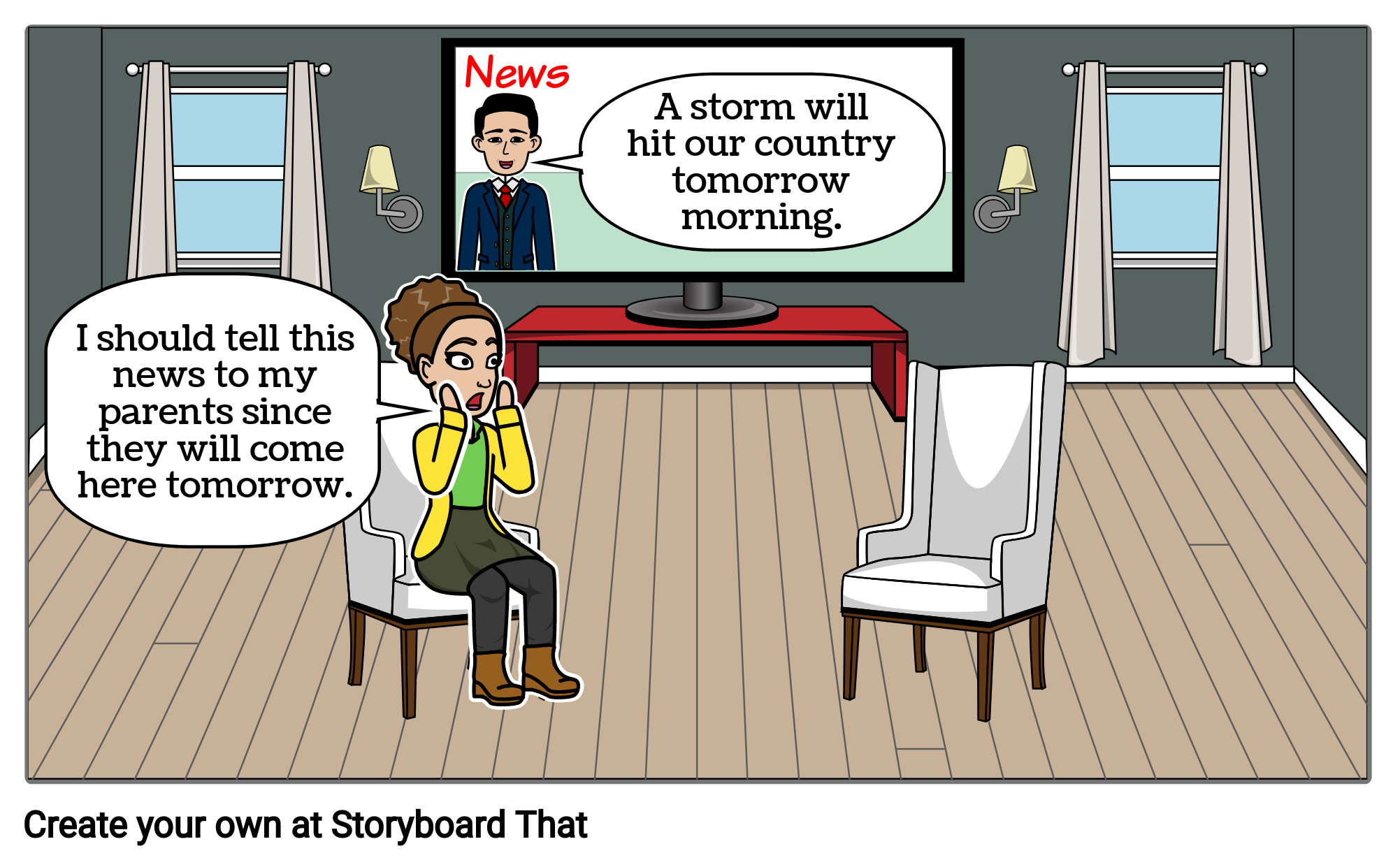LESSON GOAL
Let’s check our lesson goal.
In this material, you will learn the words and phrases that are used when talking about news and press media and express your opinions about specific topics.
In this material, you will learn the words and phrases that are used when talking about news and press media and express your opinions about specific topics.
この教材では、ニュースや報道に関連した語彙や表現を学び、特定の話題について意見を述べる練習をします。
PART A_1
Please study the picture below. Then, describe it in as much detail as you can.
PART A_2

| Answer: | |
| . |
PART A_3
Now, let me ask you a question about the picture.
PART A_4
| 1. | Why is the woman worried? |
| Answer: |
PART A_5
Now, let us review your answers.
(Please review your student’s answers by sending the correct answers in complete sentences. After that, ask your student to read aloud his or her corrected answers.)
PART A_6
Choose the correct meaning of the underlined word in each sentence.
PART A_7
| 1. | He is one of the famous reporters in the Philippines. |
| a. | [verb] to report in front of a camera |
| b. | [noun] a person who reports or tells the news |
| c. | [noun] a person who swims |
| 2. | Her parents will watch the news tonight. |
| a. | [noun] the announcement of the latest events on television and radio |
| b. | [noun] a newspaper |
| c. | [verb] to watch news |
| 3. | We interviewed dozens of applicants yesterday. |
| a. | [verb] to ask someone questions in an interview |
| b. | [verb] to update someone |
| c. | [noun] a person who likes asking questions |
| 4. | The witnesses told the police what happened. |
| a. | [adjective] tired and ready to sleep |
| b. | [noun] a person who watches the news |
| c. | [noun] a person who saw the accident |
| 5. | The reporter will deliver the news in five minutes. |
| a. | [verb] to speak in front of the camera |
| b. | [verb] to give foods to someone |
| c. | [noun] a person who makes the news |
PART A_8
Now, let us review your answers.
(Please review your student’s answers by sending the correct answers in complete sentences. After that, ask your student to read aloud his or her corrected answers.)
PART B_1
Please construct your own sentences using the following words.
PART B_2
| 1. | reporter | Answer: | . | |
| 2. | deliver | Answer: | . | |
| 3. | the news | Answer: | . | |
| 4. | interview | Answer: | . | |
| 5. | witness | Answer: | . |
PART B_3
Now, let us review your answers.
(Please review your student’s answers by sending the correct answers in complete sentences. After that, ask your student to read aloud his or her corrected answers.)
PART C_1
Fill in the blanks. Choose the correct answers in the box below. Then, read aloud each sentence by changing the correct answer into its proper form if necessary.
PART C_2
| deliver | witness | reporter |
| interview | the news | accident |
| 1. | He likes watching ____________ because it keeps him updated. |
| 2. | She has been working as a ____________ for five years. |
| 3. | The reporter will ____________ the president in the afternoon. |
| 4. | A reporter must always ____________ the news on time. |
| 5. | One of the ____________ does not want to be interviewed. |
PART C_3
Now, let us review your answers.
(Please review your student’s answers by sending the correct answers in complete sentences. After that, ask your student to read aloud his or her corrected answers.)
PART D_1
Let’s talk. Please answer the questions by stating your opinions.
PART D_2
| 1. | Some people say that the news is not always true. What do you think about that? |
| Answer: | |
| 2. | It is better to watch the news on TV than read it in newspapers. Do you agree or disagree? |
| Answer: |
PART E_1
Now, I will ask you the following questions. You may ask questions, too.
PART E_2
| 1. | Do you always watch the news? Why or why not? |
| Answer: | |
| 2. | Do you prefer watching the news on television or online? |
| Answer: | |
| 3. | Have you ever thought of becoming a reporter? |
| Answer: | |
| 4. | What’s the latest news you have watched or listened to? |
| Answer: | |
| 5. | How often do you read newspapers? |
| Answer: | |
| 6. | How do you stay updated with what is going on in your country when you don’t watch nor listen to the news? |
| Answer: | |
| 7. | Should news in Japan be translated into English? Why or why not? |
| Answer: |
REVIEW AND FEEDBACK
Now, let us review the things that you learned in this lesson.
ではこのレッスンで学んだことを振り返りましょう。
(Please give a short feedback on how your student did on your class.)
| Grammar 文法 |
Pronunciation 発音 | Vocabulary 単語 |
Comprehension 理解 |
|
|---|---|---|---|---|
 GOOD GOOD |
文法の誤りはほとんどなく、完全な文章で話すことができる | ほとんどの単語をはっきりと正しく発音することができる | 習った表現を適切に使うことができる | 文章を理解し、質問に正しく答えることができる |
 FAIR |
文法の誤りはあるが、完全な文章で話すことができる | 発音の練習が必要な言葉がいくつかある | たまにミスはあるが、習った表現を適切に使うことができる | 文章を完全に理解するのは難しく、質問に正しく答えられないときもある |
 POOR |
文章で話すのは難しく、単語だけで話すことができる | 発音の練習が必要である | 習った単語と表現を少しだけ使うことができる | 文章を理解するのは難しく、質問に答えるのは難しい |
レッスン教材に関するアンケートのお願い
レッスン教材の改善・拡充を図ることを目的とし、アンケートを実施しております。
以下のURLからアンケートにお答えいただき、 ご意見・ご要望をお聞かせください。
アンケートはこちら